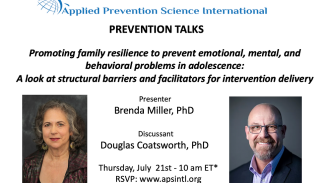Promoting family resilience to prevent emotional, mental, and behavioral problems in adolescence

APSI presents the next in its series of Prevention Talks
"Promoting family resilience to prevent emotional, mental, and behavioral problems in adolescence: A look at structural barriers and facilitators for intervention delivery".
Time & Location
Jul 21, 10:00 AM – 11:00 AM EDT
Zoom Meeting (Registration page)
About the Event
Dr. Brenda Miller will provide an overview of some of the structural barriers and facilitators for delivering effective interventions to families with adolescents. These interventions are designed to strengthen resilience and prevent adolescent emotional, mental, and behavioral problems—a major challenge in this time of COVID. She will describe how the larger community’s beliefs, values, attitudes, and practices can be important to the effectiveness of prevention efforts. These can determine the extent to which there is trust and communication that can support healthy and resilient families. From her own research and other sources, she will discuss existing community infrastructures that can provide critical support to such resilience. Past research on family-based interventions has shown the difficulty in reaching families with effective interventions. Dr. Miller will describe how online self-directed interventions can expand delivery to reach more families in the community. She will examine internal organizational characteristics and dynamics that are relevant to building an effective implementation infrastructure. These will look at some characteristics and dynamics that are especially important to families. Finally, examples of policy and legal approaches for supporting resilient families will be presented. An open discussion, led off by Dr. Doug Coatsworth, will follow the presentation. The discussion will highlight opportunities for addressing barriers and facilitators for intervention delivery, as well as approaches for improving the resilience of families in communities.
Speakers
Brenda A. Miller, Ph.D. is a senior scientist at the Prevention Research Center, PIRE, in Berkeley, California. Most recently, she and her colleagues completed a clinical trial for a family-based, on-line intervention that reduced older teen’s risks related to alcohol use and romantic relationships. Prior research on family-based interventions to address adolescent alcohol and other psychoactive substance use included studies conducted in Thailand, in Canada, and in the Kaiser Permanente health care system. She and her colleagues have also conducted research and intervention studies with young adults who engage in high-risk drug and alcohol use while in nightclubs and who experience physical and sexual aggression. An important part of this research is to engage communities in the research process and to be committed to research that makes a difference for individuals and families in communities.
Douglas Coatsworth, Ph.D. is Betsey R. Bush Endowed Professor in Behavioral Health and Associate Dean for Research in the College of Social Work at the University of Tennessee in Knoxville, Tennessee. Dr. Coatsworth is trained as a child clinical psychologist and completed a postdoctoral training prevention science. He has been working in the field of substance use treatment and prevention research for the past 30 years. His work has primarily involved the development and evaluation of family-based programs designed to work with families of adolescents using substances and to promote parenting and family skills to prevent adolescents from using substances. Part of his research has involved adapting treatment interventions to be effective as preventive interventions and to modify interventions to be culturally appropriate for non-majority groups in the United States. His research also focuses broadly on aspects of risk and resilience and the development of competence in adolescence and emerging adulthood, so he is particularly interested in how family-focused interventions promote adolescent skills and characteristics that help prevent problem behavior during these age periods. He and his collaborators are currently researching the development and evaluation of an adapted version of the Strengthening Families Program: For Parents and Youth 10-14, which integrates mindfulness activities. The intervention applies mindfulness principles and interventions within a preventive intervention to teach parents and youth how to deal more effectively with daily stressful situations, especially in their relationships.
He is also actively involved in working with community organizations and schools to design, select and evaluate programs to prevent substance use and build health and resilience in youth. He is working with organizations to build University-Community-State partnerships in Tennessee to promote the use of evidence-based prevention programs throughout the state.
